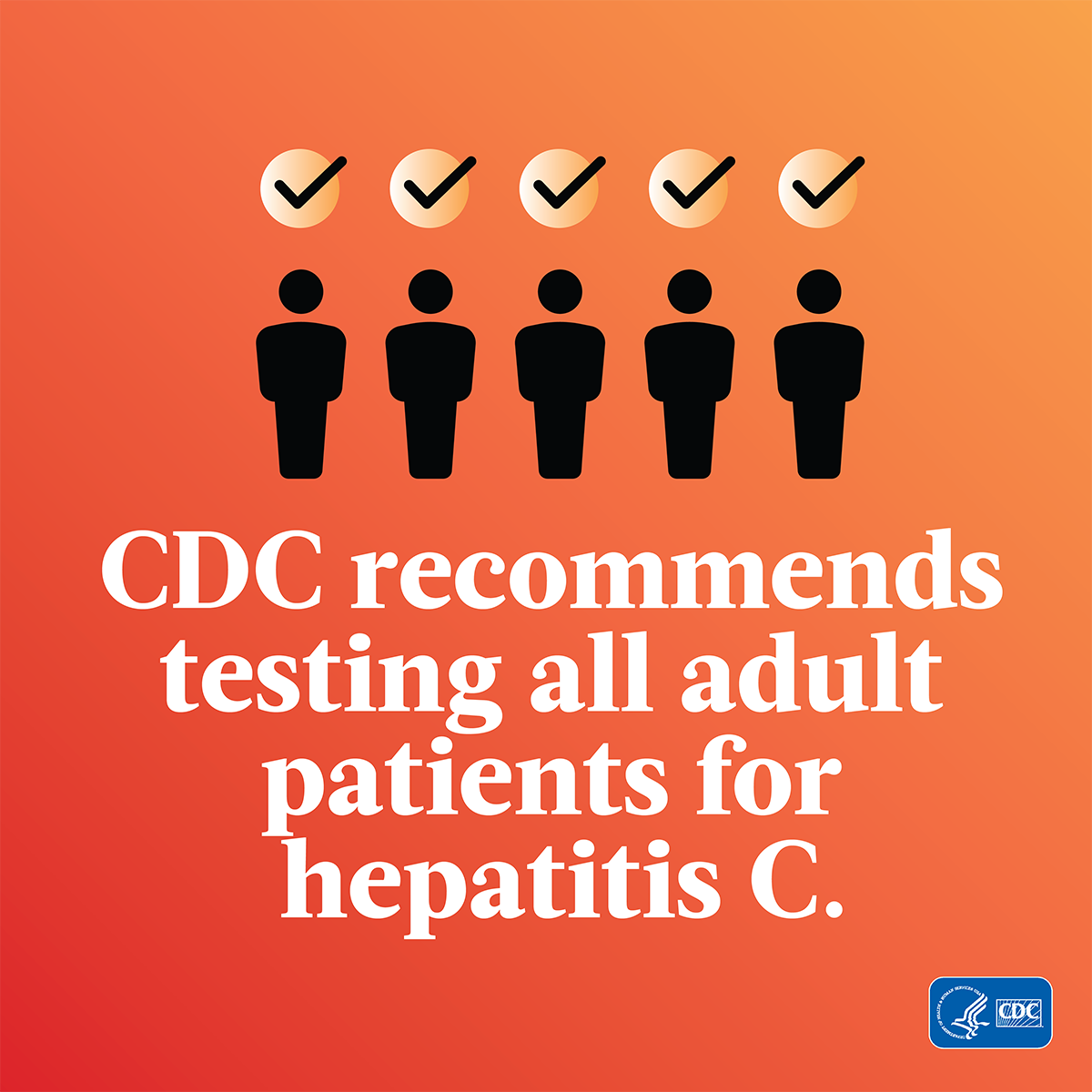Testing Recommendations for Hepatitis C Virus Infection
CDC Recommendations for Hepatitis C Screening Among Adults in the United States
- Universal hepatitis C screening:
- Hepatitis C screening at least once in a lifetime for all adults aged 18 years and older, except in settings where the prevalence of HCV infection (HCV RNA‑positive/detected) is less than 0.1%*
- Hepatitis C testing for all pregnant people during each pregnancy, except in settings where the prevalence of HCV infection (HCV RNA‑positive/detected) is less than 0.1%*
- One‑time hepatitis C testing regardless of age or setting prevalence among people with recognized conditions or exposures:
- People with HIV
- People who ever injected drugs and shared needles, syringes, or other drug preparation equipment, including those who injected once or a few times many years ago
- People with selected medical conditions, including:
- people who ever received maintenance hemodialysis
- people with persistently abnormal ALT levels
- Prior recipients of transfusions or organ transplants, including:
- people who received clotting factor concentrates produced before 1987
- people who received a transfusion of blood or blood components before July 1992
- people who received an organ transplant before July 1992
- people who were notified that they received blood from a donor who later tested positive for HCV infection
- Health care, emergency medical, and public safety personnel after needle sticks, sharps, or mucosal exposures to HCV‑positive blood [PDF – 177 KB]
- Children born to mothers with HCV infection
- Routine periodic testing for people with ongoing risk factors, while risk factors persist:
- People who currently inject drugs and share needles, syringes, or other drug preparation equipment
- People with selected medical conditions, including:
- people who ever received maintenance hemodialysis
- Any person who requests hepatitis C testing should receive it, regardless of disclosure of risk, because many persons may be reluctant to disclose stigmatizing risks. See complete CDC Recommendations for Hepatitis C Screening Among Adults – United States, 2020
CDC Recommendations for Hepatitis C Testing Among Perinatally Exposed Infants and Children in the United States
- Test all infants and children born to pregnant persons with current or probable HCV infection.
-
- Pregnant persons with detectable HCV RNA are considered to have current HCV infection. Pregnant persons are considered to have probable HCV infection if HCV antibody testing is reactive, and HCV RNA is not available.
- Test all perinatally exposed infants using a nucleic acid test (NAT) for HCV RNA at age 2 – 6 months to identify children who might develop chronic HCV infection *.
- Care for infants with detectable HCV RNA should be coordinated in consultation with a health care provider with expertise in pediatric hepatitis C management.
- Infants with undetectable HCV RNA do not require further follow up unless clinically warranted.
- Additional considerations:
-
- Age 7 – 17 months: Those who have not previously been tested should receive a NAT for HCV RNA.
- Age 18 months and older: Those who have not previously been tested should receive an HCV antibody test with reflex to NAT for HCV RNA (i.e., automatic testing when antibody is reactive). See complete Recommendations for Hepatitis C Testing Among Perinatally Exposed Infants and Children—United States, 2023
Operational Guidance for Complete Hepatitis C Testing
CDC recommends that all samples needed to diagnose hepatitis C be collected in a single visit and HCV RNA testing be performed automatically when the HCV antibody is reactive.
“Automatic” testing happens in the laboratory without additional action on the part of the patient or the healthcare provider.
Automatic testing is critical to increase the number of people diagnosed with current HCV infection who can then be linked to care and curative antiviral therapy. See complete Updated Operational Guidance for Implementing CDC’s Recommendations on Testing for HCV Infection.
Testing Sequence
Hepatitis C testing should be initiated with a U.S. Food and Drug Administration (FDA) approved HCV antibody test. People testing HCV antibody positive/reactive should receive automatic testing with an FDA approved nucleic acid test (NAT) for detection of HCV RNA. See complete Recommended Testing Sequence for Identifying Current Hepatitis C Virus (HCV) Infection. People testing HCV antibody positive/reactive with detectable HCV RNA have current HCV infection and should receive curative treatment.
USPSTF Recommendations
U.S. Preventive Services Task Force – Screening for Hepatitis C Virus Infection
The USPSTF recommends screening for hepatitis C virus (HCV) infection in adults aged 18 to 79 years. Grade: B Recommendation.
Resources
- Newly Reported Hepatitis C Infections and Recommendations for Universal Hepatitis C Screening [PDF – 39 pages]
Slide set from April 9, 2020 webinar - Summary of CDC Recommendations for Hepatitis C Screening Among Adults [PDF – 690 KB]
- Dramatic increases in hepatitis C: CDC now recommends hepatitis C testing for all adults – Vital Signs fact sheet for consumers, partners and providers
- Testing for HCV infection: An update of guidance for clinicians and laboratorians. [PDF – 4 pages]
MMWR 2013; Vol. 62 Early Release - Recommended Testing Sequence for Identifying Current Hepatitis C Virus (HCV) Infection [PDF- 1 page]
- Interpretation of Results of Tests for Hepatitis C Virus (HCV) Infection and Further Actions [PDF- 1 page]
* Off-label use of an FDA-approved diagnostic test requires validation by the testing laboratory.
